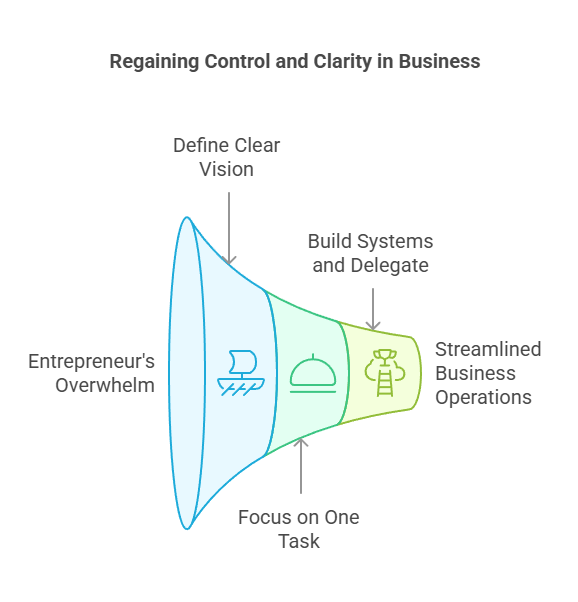Why Does Starting My Own Business Feel So Overwhelming?

Why Starting Your Own Business Feels Overwhelming—and How to Regain Clarity and Confidence
Starting a business is like stepping into the middle of a chaotic orchestra, where you’re suddenly tasked with conducting without a sheet of music or preparation. For women transitioning from corporate leadership to entrepreneurship, this orchestra is often filled with unfamiliar instruments, and the absence of a roadmap can feel overwhelming. The excitement of building something new is undeniable, but the overwhelm can feel suffocating. Why? Because starting your own business demands that you juggle multiple roles, make countless decisions, and face the uncertainty of uncharted territory—all at the same time. But while this chaos might feel like a storm, it’s also an opportunity to embrace growth and discover your resilience.
The Overwhelm You Can’t Shake
You’ve made the bold decision to step out of the corporate world and into entrepreneurship. For many women, this choice comes with a mix of liberation and fear—a thrilling opportunity to align your work with your personal values, but also a daunting challenge to navigate uncharted waters.
Every day feels like a juggling act:
- Which task should I prioritize first?
- How do I make decisions when there’s so much to figure out?
- Will I ever feel like I have it all under control?
This sense of overwhelm is normal. But here’s the truth: Overwhelm isn’t a sign that you’ve made the wrong choice—it’s a sign that you’re growing.
Why Starting a Business Feels So Overwhelming
1. Too Many Decisions, Too Little Clarity
When you’re starting out, everything feels urgent, and there’s no roadmap to follow. You’re not just wearing one hat—you’re wearing all of them. Decision fatigue becomes a constant companion, and the sheer volume of choices can leave you feeling stuck.
2. Fear of the Unknown
The safety net of a corporate role is gone. You’re stepping into unfamiliar territory, which can amplify self-doubt and second-guessing. As one entrepreneur put it, “Starting my business felt like staring into a foggy abyss and hoping there was solid ground beneath.”
3. The Myth of “Hustle Culture”
Social media bombards you with messages about hustling 24/7, making it feel like you’re failing if you’re not constantly working. But the reality? Endless hustle leads to burnout, not breakthroughs. Like a hamster on a wheel, you may feel like you’re moving but going nowhere.
The Mindset Shift: You Don’t Have to Do It All
Here’s the truth: You don’t need to know everything or do everything to succeed. Starting a business isn’t about perfection—it’s about progress.
Reframe the Overwhelm
- Instead of thinking, “I have to figure this all out now,” shift to, “I’m building step by step.”
- Replace, “I’m not doing enough,” with, “I’m prioritizing what matters most.”
3 Steps to Regain Control and Clarity
1. Start With a Clear Vision
Without a clear destination, it’s easy to get lost in the weeds of day-to-day tasks. Your vision serves as your North Star, guiding every decision you make. Imagine trying to assemble a puzzle without seeing the picture on the box—your vision provides that picture.
Action Step: Write down what success looks like for you in 6 months, 1 year, and 5 years. Be specific about your goals, lifestyle, and business structure. Use this vision-setting worksheet to clarify your goals.
Pro Tip: Revisit your vision regularly and adjust as needed. Think of it as a compass rather than a fixed map.
Metaphor: Your vision is the lighthouse that keeps you anchored and focused, even when the seas of entrepreneurship feel rough.
2. Focus on One Thing at a Time
Trying to tackle everything at once will only keep you spinning your wheels. High achievers often fall into the trap of thinking multitasking equals productivity—it doesn’t. Imagine balancing five delicate plates in the air, each one representing your business, family, finances, health, and personal goals. The constant fear of letting one fall can be exhausting and unsustainable, especially when all demand your immediate attention.
Action Step: Each morning, identify the one task that will have the biggest impact on your business that day, and focus on completing it before moving on. For guidance, check out the Eisenhower Matrix for prioritization.
Practice: Start a daily habit of planning your top three priorities every evening for the next day.
Story: A friend of mine, Sarah, grew her consulting business by focusing solely on client acquisition for two months. By the end of the quarter, she had doubled her client base because she resisted the urge to split her focus.
3. Build Systems and Delegate Early
The overwhelm often comes from trying to do everything manually. High-value entrepreneurs rely on systems and people to streamline their work. Think of systems as the “invisible team” that keeps your operations running smoothly.
Action Step: Identify repetitive tasks (e.g., scheduling, email responses) and research tools or services to automate them. Consider using tools like Zapier for automation. If budget allows, consider outsourcing smaller tasks to a virtual assistant through platforms like Upwork.
Example: Use automated email sequences to nurture leads while you focus on strategy.
Pro Tip: Start small by delegating low-stakes tasks first to build trust and confidence in your systems or team.
Metaphor: Imagine running a relay race—systems and delegation are your teammates passing the baton so you don’t have to sprint the entire distance alone.
A Story of Progress: From Chaos to Confidence
Take Emily, a former tech executive who transitioned to consultancy after years of corporate success. Like many women entrepreneurs, she was driven by the desire to make an impact while enjoying greater flexibility. Yet, she initially struggled to balance her workload and establish boundaries. At first, she tried to handle everything—from client outreach to managing her website—while also designing her offers. She constantly felt behind, doubting if she had what it took to succeed.
One day, Emily decided to simplify. She wrote down her top priorities, focusing only on tasks that directly led to client acquisition. She automated her scheduling system and hired a virtual assistant to handle admin work.
Within months, Emily’s business grew steadily, and she felt more confident than ever. The secret? Emily realized she didn’t have to do everything—she just had to focus on the right things.
Why This Matters
Feeling overwhelmed when starting your own business doesn’t mean you’re failing—it means you’re human. The transition from corporate to entrepreneurship is full of learning curves, but it’s also full of opportunities to grow, adapt, and thrive.
When you focus on clarity over chaos, progress over perfection, and systems over struggle, you’ll build a business that works for you—not the other way around.
FAQs: Common Questions About Starting a Business
1. How do I know which tasks to prioritize?
Use a prioritization tool like the Eisenhower Matrix to categorize tasks by urgency and importance. For instance, critical client proposals or financial management would fall under urgent and important, while building a long-term marketing strategy might be important but less time-sensitive. Start by focusing on tasks that are both urgent and important, and gradually move to tasks that are important but not urgent. This ensures you’re always working on what truly matters.
2. What tools can help me manage my time better?
Consider tools like Trello, Asana, or Todoist for task management, and Calendly for scheduling. These tools simplify your workflow by centralizing tasks and deadlines. For entrepreneurs juggling multiple hats, a well-organized tool can feel like a personal assistant.
3. How can I delegate effectively on a small budget?
Hire freelancers or virtual assistants for specific tasks on platforms like Fiverr or Upwork. Begin by outsourcing repetitive or time-consuming tasks like data entry or social media scheduling. Even a few hours of assistance a week can free you up to focus on high-impact activities.
4. How do I stay motivated during tough times?
Break down large goals into smaller milestones and celebrate small wins to keep your momentum. Create a vision board to remind yourself of why you started. A quote from Winston Churchill might inspire you: “Success is not final, failure is not fatal: It is the courage to continue that counts.”
5. What if I’m not ready to hire help yet?
Start by automating repetitive tasks using tools like Zapier or Google Workspace. Automation allows you to work smarter, not harder, without needing to expand your team. For example, automate email follow-ups to save time and maintain consistency.
6. How do I overcome fear of failure?
Shift your mindset to view failures as learning opportunities. Remember, every entrepreneur faces setbacks—it’s how you adapt that matters. As Thomas Edison famously said, “I have not failed. I’ve just found 10,000 ways that won’t work.”
Take the First Step Toward Clarity
You don’t have to navigate the overwhelm alone. Imagine having a step-by-step plan and personalized support to guide you through the early stages of your business.


Final Words
Starting your own business is a bold and rewarding journey. By focusing on clarity, prioritizing key actions, and leveraging tools and support systems, you can conquer overwhelm and create a business that reflects your vision and values. Take one step today to bring your entrepreneurial dreams closer to reality.
If something in this post hit home—this might be your moment to step into real clarity.
About the Author
Juan Carlos Arzola, CHPC, is a faith-driven visionary, proud Peruvian, and devoted single father of two incredible sons, living and thriving in Miami. As a Certified High-Performance Coach to the world’s most ambitious achievers—leaders pursuing transformative dreams such as Nobel Prizes, United Nations initiatives, and NASA-level innovations—Arzola is deeply committed to empowering others to lead lives of significance.
Arzola is the founder and CEO of Ask.me, a revolutionary platform designed to help professionals successfully transition into entrepreneurship. His own inspiring journey from employee to thriving entrepreneur reflects his unwavering belief in transformation through faith, purpose, and strategic leadership.
A best-selling author, Arzola wrote The Success Start: Proven Practices to Build a Life of Significance, a guide that has empowered countless readers to define and achieve their personal and professional goals. The book is available on Amazon and at the prestigious Harvard Book Store. As a co-author of The Big Question with broadcasting legend Larry King, he shares profound insights on life, leadership, and legacy. Learn more about his collaboration with Larry King here.
A sought-after speaker and podcast guest, Arzola has shared his expertise on renowned platforms including The Culture Matters Podcast, Grown Folks Talking Live, and The Dreamcast Podcast. With a focus on personal growth, high performance, and creating meaningful impact, he equips high achievers with actionable strategies and inspiring insights to refine their visions and achieve measurable success.
Arzola’s work blends practical wisdom with a deep sense of purpose, helping individuals unlock their full potential and leave lasting legacies. Learn more about his mission to transform lives and inspire change at Ask.me.


